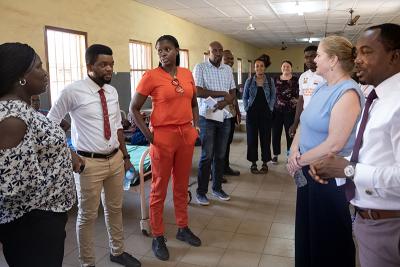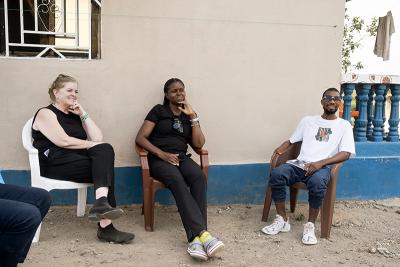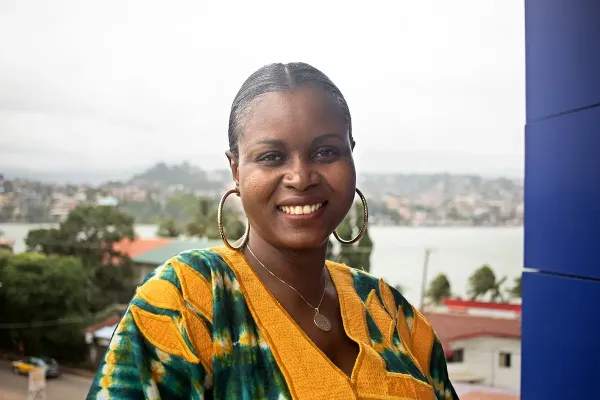After about eight months as interim executive director, Vicky Reed was appointed Partners In Health (PIH) Sierra Leone’s new executive director in August.
A dedicated nurse and leader, Reed grew up in Freetown and moved to the United States when she was 15, during the beginning of Sierra Leone’s 11-year civil war. While in the U.S., she earned degrees in international business and Spanish, then spent seven years in banking.
Inspired by her mother and grandmother, Reed made a career change and enrolled in nursing school. After several visits to Sierra Leone —including for the funeral of her beloved grandmother, a respected nurse—Reed was drawn to move home. A PIHer since 2019, Reed was first hired as PIH Sierra Leone’s director of nursing. In that role, she mentored nurses, developed protocols to improve care, and participated in the Global Nurse Executive Fellowship. In December 2023, she transitioned into the interim executive director role.
We spoke with Reed about her background, new position, and the road ahead. Below, edited and condensed, are her responses:
Describe the moment you learned you were selected as executive director. How did you feel?
It depends on which time. After the leadership transition in December, it was overwhelming because this is not something I aspire to; I just came here to do my job. The fact that I was considered for the role is a huge honor and privilege. I think the second time around when the position was confirmed in August, I felt some sort of validation because I didn’t expect the news. Being appointed into the permanent position made me feel that I am doing something right.
How have your life and professional experiences uniquely positioned you to successfully lead PIH Sierra Leone?
Growing up, my dad always taught us that when you work hard, you’ll be recognized for your hard work. Don’t point out the things that you’re doing. You work hard because that’s what you’re supposed to do, and then anything else that happens afterwards, you deserve it. In terms of my career, this is just how I’ve always been. I’ve never been one to be in the forefront and have always preferred to be in the background.
My career as a nurse really prepared me for this role. Nurses are always thrown into the fire and the unexpected. You try to juggle different things with competing priorities. When I started my career in nursing, I worked in the medical surgical unit where you had to take care of five or six patients, or even sometimes seven or eight. Even if you were short-staffed, you had to provide the best possible care.
What are some of the challenges in health care delivery that you, and PIH Sierra Leone, face as you look ahead?
Most people can’t afford health care, and we don’t have a free health care system in Sierra Leone. In collaboration with the government, we at PIH are trying to fill the gap and address many health care needs. We are focusing on providing care and meeting the needs of the most vulnerable patients.
Many PIHers in Sierra Leone know you; however, many others haven’t had the pleasure of meeting you. With that in mind, what is something that most people don’t know about you that you’d like to share?
Most people know I have three kids: two daughters and a son. Maybe one thing they don’t know is that my oldest daughter is in her last year of high school, so she’ll start college soon. And when I look back at it, I can’t believe that I almost have kids in college!
Do your kids want to follow your path?
I did not push any of my kids into health care. However, my oldest daughter, 17, wants to become a neonatal nurse. And my youngest daughter, 12, wants to be a midwife. I don’t know where she got that from either because that’s not something we even talk about in the U.S. When they came to Sierra Leone in 2022, they shadowed Dr. Naphtal while he was feeding babies in the special care baby unit. They wanted to pursue health care even before they got that exposure.

PIH Sierra Leone Executive Director Vicky Reed (third from left) with staff during a tour of the female ward at PIH-supported Sierra Leone Psychiatric Teaching Hospital in Freetown on January 17, 2024.
Photo by Sabrina Charles / Partners In Health
Reflecting on your time at PIH, what is your most memorable moment and why?
There are so many memorable moments. There’s one patient who had issues with gastrointestinal (GI) bleeding and was often in the emergency department. We once sent him to Freetown to undergo a procedure at a private hospital. Then, a few months later we were planning a computer training session for some of the nurse mentors, and it turned out that the patient was one of the instructors.
The fact that he was teaching our nurses was a full circle moment because this is somebody who we can’t view as just a patient. Patients are people who have lives outside of the hospital. And the impact that we had on him to where he’s still able to go out, make a living, and now teach PIH staff, is special.
You’ve previously discussed the tremendous impact that your grandmother, a nurse, had on your life and career. Who else inspires you and why?
My dad inspires me because he has always been a very humble person, displays humility, and respects people regardless of their stature in life. He was a professor, deputy minister of foreign affairs, and minister of tourism. He knows the value of hard work and always instilled that in me.
When I think about things, I don’t get worked up or worried about different positions or what I believe I deserve because I feel like whatever you deserve is going to come back to you. The way he approaches things and handles different situations in life is inspiring.
Which PIHer is a mentor or go-to person for you and why?
Right now, Patrick Ulysse because he is supportive and pushes me to come out of my shell; however, all staff inspire me in some way. There’s a woman who has worked at PIH’s guest house since 2014, the year PIH began working in Sierra Leone. She really willed herself and joined PIH’s adult literacy program. While I was at the office last week, she was using a laptop and sending emails. This is huge because this is someone with no formal education who couldn’t read or write. She’s self-motivated, puts herself out there, and always wants to learn. She’s somebody I really look up to.
What do you want people who aren’t familiar with PIH (both nationally and globally) to know about PIH Sierra Leone and the country’s history?
Sierra Leone has had a very tough history with the decade-long civil war, Ebola, mudslides, and Covid—all of which have impacted our health system. At one point, Sierra Leone had the worst maternal mortality rate in the world. The numbers are much better now, but there are still challenges.
We have very poor health outcomes nationwide in many different indicators. But at PIH, we are not just going to focus on one thing, rather we are going to address everything in terms of the 5 S’s model. It’s not an easy feat, but we’ve made that commitment to stay and improve the health care system. Personally, I want people to understand that this is very challenging, but if we continue to get support from people, this is something feasible for us to do.

PIH CEO Dr. Sheila Davis (left) and PIH Sierra Leone Executive Director Vicky Reed (center) during a community health worker’s visit with Aiah Fornah Yofari (right) in Kono District, Sierra Leone on January 19, 2024.
Photo by Chiara Herold / Partners In Health
What has been the biggest change in pivoting from director of nursing to executive director?
As director of nursing, I was focused on clinical work. As executive director, I have responsibilities beyond that. Since I started this role, I’ve been trying to better understand finance and operations because those are not my strong suits. However, those areas are very important for the organization because if we strengthen financial and operational systems, then we can improve our clinical work. Expanding beyond the clinical side has been one of the biggest changes for me and has allowed me to more deeply understand what’s going on within PIH.
Is there anything you’d like to share that I didn’t ask you about?
This has been an interesting time in my life and for the organization. It has been a challenging year with many transitions, but I think this is the start of something better. I’m looking forward to steering the organization to make sure that we are a site that others can learn from and gain insights, just like we are doing with other PIH sites now. I want PIH Sierra Leone to become a model for the rest of the organization.
